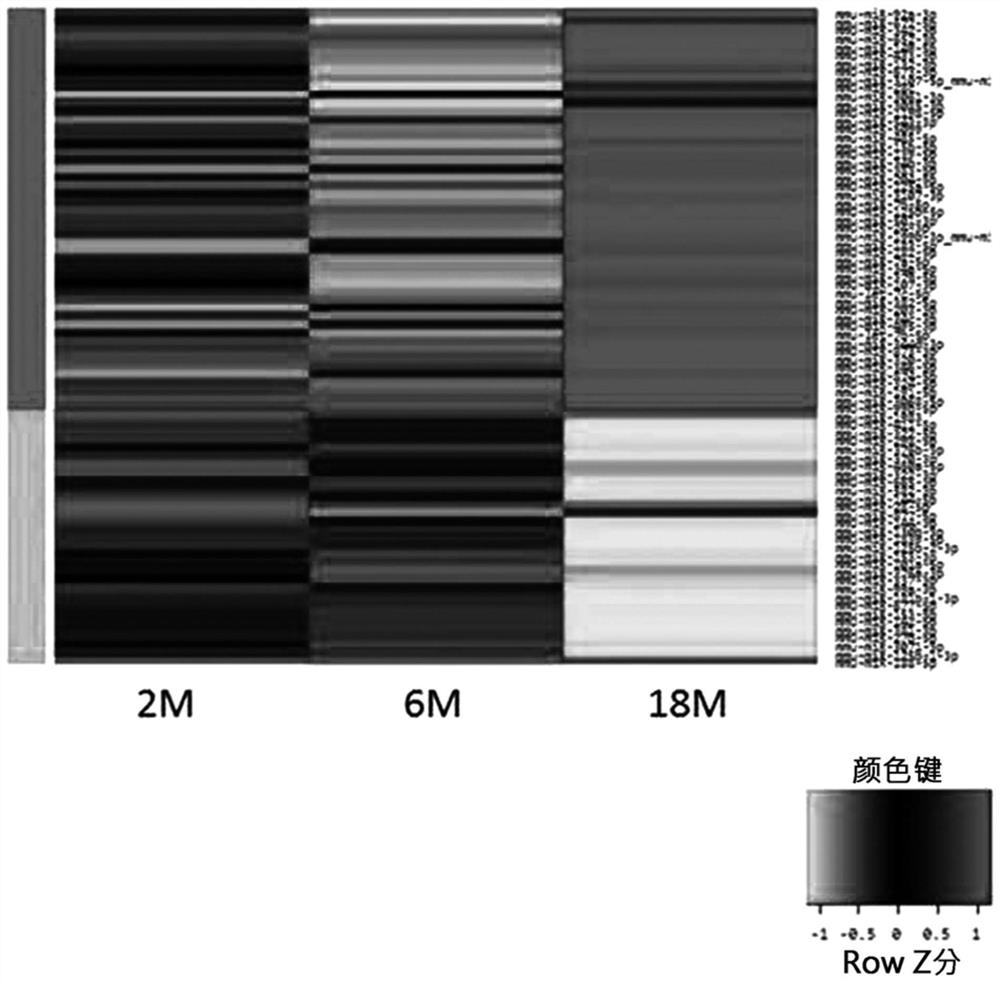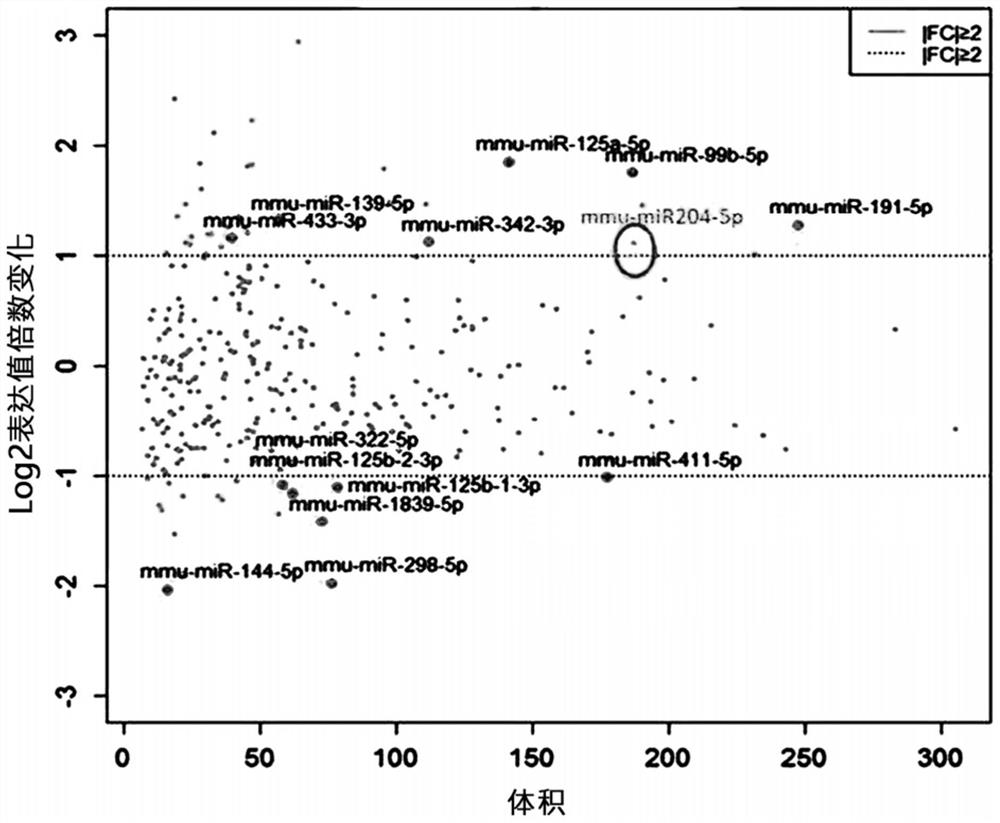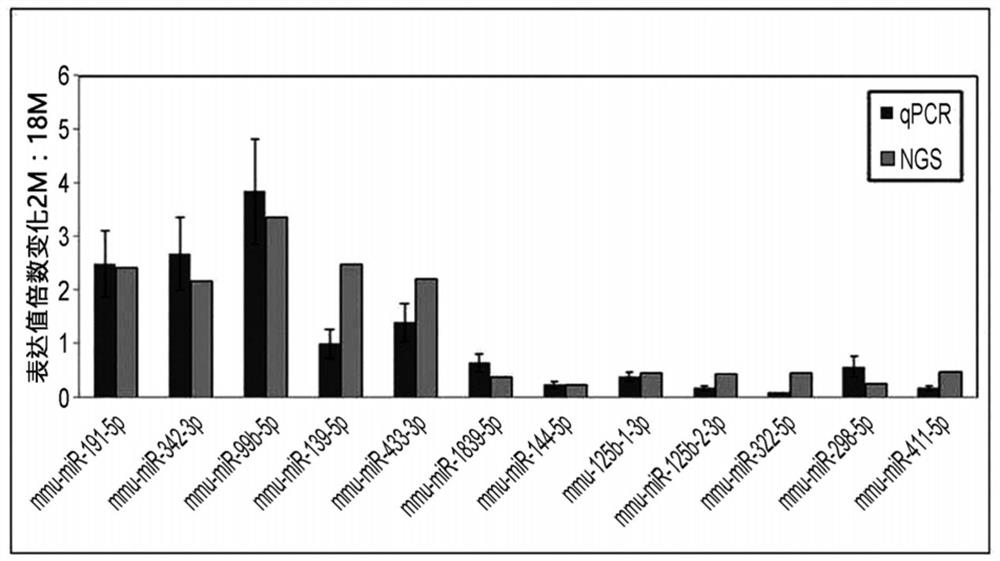Screening method for pharmaceutical composition and inhibitor for hippocampal function decline
A screening method, hippocampal technology, applied in drug combinations, biochemical equipment and methods, pharmaceutical formulations, etc.
- Summary
- Abstract
- Description
- Claims
- Application Information
AI Technical Summary
Problems solved by technology
Method used
Image
Examples
Embodiment 1
[0100] Example 1. Profile analysis of small RNAs (small RNAs) related to the aging process of the hippocampus
[0101] In the present invention, in order to understand the microRNAs that mediate the regulation of the aging process of the hippocampus, small RNA (small RNA; smRNA or sRNA, hereinafter referred to as sRNA) was performed on male mice of 2 months, 6 months, and 18 months. analyze.
[0102] 1-1: Animal preparation and tissue collection
[0103] Three common wild animals of different ages at 2 months, 6 months and 18 months were obtained from the Korea Research Institute of Bioscience & Biotechnology-Institutional animal care and use committee (KRIBB-IACUC). type male C57BL / 6J mice.
[0104] Hippocampus tissue was immediately dissected and cryopreserved using liquid nitrogen by sacrificing normal mice without tumors or traces of disease. Their health status was confirmed by a series of serum tests, and eight hippocampal tissues were obtained from four mice in eac...
Embodiment 2
[0132] Example 2. Analysis of the pathway of the target gene
[0133] All catalogs of expected target genes expressing different microRNAs according to the aging process were input into the gene function analysis of DAVID, KEGG (Kyoto Encyclopedia of a Genes and Genomes) together with the basic parameters limited to the results of the mouse species ( http: / / david.abcc.ncifcrf.gov / ) and Ingenuity Pathway Analysis (Ingenuity Pathway Analysis) ( Systems, http: / / www.ingenuity.com ).
[0134] Table 2
[0135]
[0136]
[0137] As a result, as shown in Table 2 above, a variety of biological effects were derived, mainly expected to be quite significant in the presence of cancer-related pathways, but for the relatively little-studied axon guidance pathway in aging (p = 4.5E- 18) conducted further research. like Figure 2a As shown, it is the same as the schematic diagram of the axon guidance pathway (axon guidance pathway). In the present invention, it is attempted to g...
Embodiment 3
[0138] Example 3. Confirmation of Eph / ephrin pathway regulation according to aging
[0139] 3-1: Confirmation of mRNA expression level
[0140] In the present invention, in order to understand how the expression of Eph / ephrin subfamily (subfamily) changes with aging, real-time fluorescent quantitative polymerase chain reaction analysis was performed.
[0141] First, in order to synthesize cDNA by reverse-transcribing the RNA of the mouse hippocampal tissue isolated in each step in Example 1, PrimeScript was used TM RT reagent Kit (Promega ImPromm-II ReverseTranscription system). Total RNA (1 μg each) was used for generation of cDNA templates according to the manufacturer's instructions, the total reaction volume was 20 μl and the thermal cycler (Bio-Rad Thermal Cycler) from Bio-Rad (Bio-Rad, USA) was used. react.
[0142] Real-time fluorescent quantitative polymerase chain reaction utilizes Bio-Rad real-time PCR system (Bio-Rad real time PCRsystem) (CFX-96) to carry out,...
PUM
 Login to View More
Login to View More Abstract
Description
Claims
Application Information
 Login to View More
Login to View More - R&D
- Intellectual Property
- Life Sciences
- Materials
- Tech Scout
- Unparalleled Data Quality
- Higher Quality Content
- 60% Fewer Hallucinations
Browse by: Latest US Patents, China's latest patents, Technical Efficacy Thesaurus, Application Domain, Technology Topic, Popular Technical Reports.
© 2025 PatSnap. All rights reserved.Legal|Privacy policy|Modern Slavery Act Transparency Statement|Sitemap|About US| Contact US: help@patsnap.com



